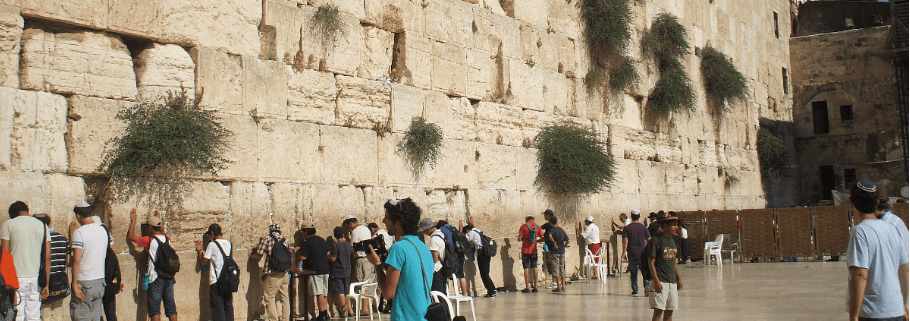I have spent the past few days in Jerusalem, combing the city for historical objects that will help me tell the story of the Christian faith. I’ve found some neat artifacts and will describe them soon enough. I’ve also spent time thinking about this notion of the Holy Land, the holy city, and holy places, and will tell you more about that soon, too. But as I head to the airport to fly home, I find myself reflecting on the media, of all things.
As I was making my final preparations for this trip, I began to hear of President Trump’s decision to relocate the American embassy, thus recognizing Jerusalem, rather than Tel Aviv, as the capital of Israel. Not surprisingly, this deeply significant move sparked outrage in many quarters. Immediately there were calls for protest across Muslim lands.
I heard about all of this and was quite concerned. I imagined finding myself in the middle of a violent hotspot. But, with non-refundable flights and a room already paid for, I was leery to bail on my trip. I appealed to some Israeli friends to seek their counsel and they said to come. In the end, I decided I’d just ensure the Canadian flag on my bag was facing out, that I remained wary, and that, hopefully, I acted wisely.
I landed at Tel Aviv, and as I approached Jerusalem in a taxi, I half expected to see flames rising over the city. There were none. As I walked through the neighborhood where my room was located, I would not have been surprised to see panicked citizens scurrying through the streets. All seemed calm and normal. Yet when I got settled and connected to the Internet, I saw the headlines dominated by pictures of riots and violence. I wasn’t quite sure what to make of this.
The next day dawned and I crisscrossed the city, visiting churches, markets, and museums. Though there was an obvious police and military presence in many parts, there were no signs of imminent or ongoing trouble. Business remained open, tour groups continued their tours, schools kept teaching. I don’t know much about Jerusalem, but surely it couldn’t be more placid and normal than this. Yet again, at the end of the day I connected to the Internet and saw all these images of chaos and violence. All the while my phone was buzzing as people told me they were praying for me, asking God to keep me safe (something I very much appreciated, of course).
I was curious. The next morning, I saw that my natural route to the location I intended to visit went through the area where these protests had taken place. Rather than go the long way around, I thought I’d head in that direction and divert if necessary. As I approached, I saw hundreds of reporters, but not a single protestor. The square was ringed by cameras and journalists, but it was otherwise calm and normal. People were strolling through it in all directions, heading to and from the market. Nearby carts were selling fruit and pastries and shops were open for business. And once again the news made it all look very different.
And now I’ve made my way back to Tel Aviv and am about to board my flight home. I made it safely. But, to be honest, I never felt unsafe. At least, I never felt any less safe than in many other cities I’ve visited.
I am not saying that protests did not happen there. Neither am I denying that they were serious or significant or that they will not continue to escalate. I’m not proposing there is a conspiracy theory in place or that everything has been staged by the media. Nothing of the sort. Rather, I guess at the end of it all I just realize in a fresh way that while the media is great at capturing events, they are not so great (or so interested) at capturing context or proportion. Their focus is on the narrow trouble spots while outside the view of their lenses, life for the multitudes may be continuing as normal. And in this case, in West Jerusalem, things really were, as far as I could see. The Jerusalem I experienced on the ground was very different from the Jerusalem I saw on my screen. That is something I hope to bear in mind in the future as I read and watch news from afar.
I am returning thankful. Thankful for safety, thankful for all that answered prayer, thankful for a profitable trip, thankful to God for allowing me to visit a city that has factored powerfully in the story—his story–he is telling in and through this world.
A few other bullet-point observations:
- When a preacher in Jerusalem says, “Calvary,” he can point to it, or at least toward it. That’s kind of powerful.
- Singing “Jesus, Lamb of God, holy is your name” seems to take on a different kind of significance in a predominantly Jewish congregation in Jerusalem versus a predominantly Gentile one in Toronto.
- Israel is easily the most expensive place I’ve visited. Though the food was especially expensive, it was excellent, with the exception of the McDonald’s Mega McAmerica burger. That was a big mistake. While we’re on the subject of McDonald’s, I learned that the Big Macs here don’t have cheese on them, since the McDonald’s are kosher but cheeseburgers are not.
- Every bit of music I heard playing in shops, restaurants, and airports was English-language covers of contemporary or “oldies” pop. The one live band I heard was doing the same (e.g. “Lucy in the Sky with Diamonds,” followed by “Losing My Religion”).
- I didn’t take many photos on this trip, and haven’t processed most of the few I did take. But here are a few Instagram snapshots from my time.










